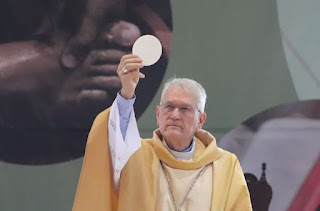Amazon Cardinal tobe wants continuing Church revolution
Amazon cardinal-to-be: "We must not deprive people of sacramental life".
The Archbishop of Manaus will become a cardinal next week. Leonardo Ulrich Steiner (71) wants reforms in the church: "How can we justify that our parishes can only celebrate Eucharist twice a year?"
How did you find out about your appointment as cardinal?
Leonardo Ulrich Steiner: We three bishops live in the same house. The auxiliary bishop, Dom Tadeu Canavarros, met me early Sunday morning and said, "Congratulations!" I asked, "Why congratulations?" And he said, "You have been made a Cardinal." I thought it was a joke. Then the news spread quickly and the people in the diocese were very happy.
What sign is Pope Francis sending when he appoints a Bishop from the Amazon region as a Cardinal?
Steiner: Pope Francis has shown his attachment to the Church in Amazonia and to the whole Amazon reality on various occasions. The Synod, his letter "Querida Amazonia" and his telephone calls during the pandemic were signs of his paternity as Bishop of Rome. Perhaps my appointment is a signal that Pope Francis wants to make the dreams of "Querida Amazonia" a reality. And that they guide the actions and presence of the Church in the region.
What social issues are particularly close to your heart?
Steiner: How do we inhabit the Amazon and care for it as our common home? Indigenous peoples and river communities are constantly attacked and robbed of their culture, religiosity and land. The environment is being destroyed by deforestation, mining and predatory fishing. The rivers are polluted by mercury and the lack of basic sanitation in the cities. There are no health and recreational facilities in the outskirts of the cities. Violence is on the rise. The deaths of journalist, Dom Phillips and indigenous researcher, Bruno Pereira represent the increasing violence. There is a lack of political commitment to the people. It is outrageous that hunger, informal work and the number of brothers and sisters living on the streets are increasing.
Pope Francis published "Querida Amazonia" shortly before the Corona pandemic. What has happened since then?
Steiner: "Querida Amazonia" shows us a certain hermeneutic. Four visions are connected: the social, the cultural, the ecological and the ecclesial version. They show us the way of evangelising action directed towards the totality of life. What is needed is an ecclesial presence that takes all dimensions into account and tries to change them. We adopted a text last June at the Assembly of the Catholic Church in Amazonia in Santarem. It says: It is about an embodied and liberating Church.
Are you disappointed that Francis did not allow the "viri probati"?
Steiner: There will be a way. In the Latin rite, there are centuries of reflections and declarations to justify compulsory celibacy. The needs of our communities show that we must continue the dialogue. How can we justify our communities being visited by a priest only twice a year and being able to celebrate Eucharist, the Sacrament of Penance and the Anointing of the Sick? The various non-ordained ministries are exercised by lay people, women and men. They enliven the communities. We must not deprive people of sacramental life.
What will you say to Pope Francis at the next opportunity?
Steiner: We are very grateful for his ministry and for his teaching ministry. He shows that mercy is the essence of the Church. Our parishes are striving to deepen their faith. I will ask the Pope to bless our presence in Amazonia.
What can we in Europe do for the people in the Amazon region?
Steiner: The mere fact that we have sisters and brothers to support us is already a great support. Several of our particular churches suffer from a lack of resources. But solidarity also means being on the same wavelength so that the shared house can be nurtured and cultivated. Solidarity with the poor is a force that transcends space and time.
What are your family's connections to Germany?
Steiner: I was born in a small community of German descent in Forquilhinha in the state of Santa Catarina. My ancestors come from Niederbreitbach in Waldbreitbach, which is near Neuwied in Rhineland-Palatinate. The Arns family emigrated to Brazil from Pünderich, Reil, i.e. the Moselle Valley. I am the fourth generation in Brazil.










.jpeg)

Comments